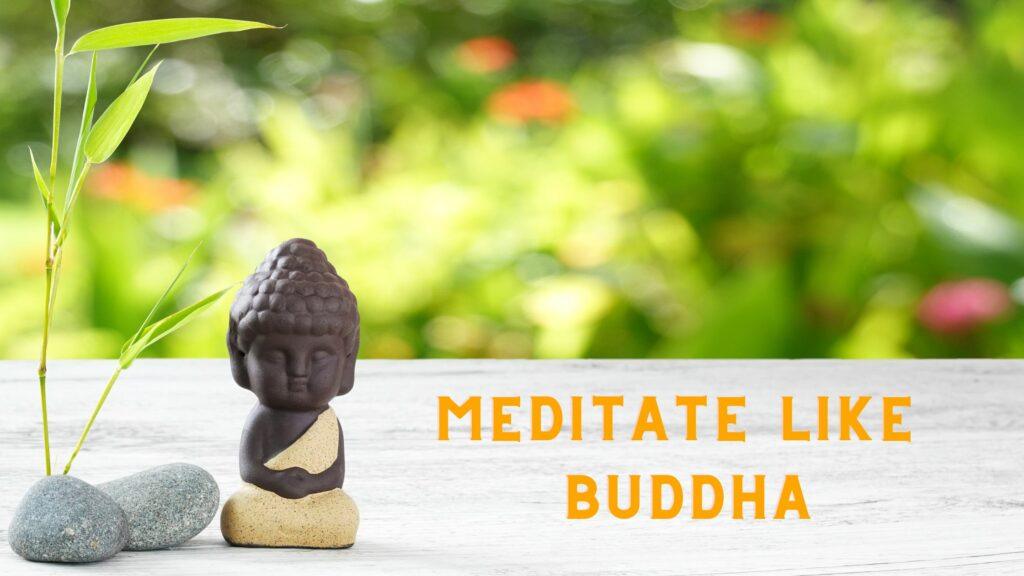What is a Bodhisattva in Buddhism, and why is this concept so important? In Mahayana Buddhism, the Bodhisattva is seen as the ultimate symbol of compassion. A being who dedicates their life to helping others awaken, even postponing their own enlightenment to do so. Unlike the traditional idea of seeking personal liberation, the Bodhisattva chooses to stay in the cycle of rebirth to guide others on the path to freedom.
In this blog post, you’ll learn the meaning and origins of the Bodhisattva, the vows they take, and the key qualities they cultivate. We’ll also see how you can apply these teachings in your daily life. Whether you’re new to Buddhism or looking to deepen your understanding, this guide will help you grasp the essence of the Bodhisattva path.
The Meaning & Origin of the Bodhisattva Concept
The word Bodhisattva comes from Sanskrit, meaning “awakening being” (Bodhi = enlightenment, Sattva = being). In Buddhism, a Bodhisattva is someone who seeks enlightenment not just for themselves but for the benefit of all living beings. This idea has deep roots in Buddhist teachings and has evolved over time.
Early References to Bodhisattvas
The concept of the Bodhisattva appears in early Buddhist texts. In Theravāda Buddhism, the term was mainly used to describe Siddhartha Gautama before he became the Buddha. Stories about his past lives, known as the Jataka tales, describe how he developed compassion and wisdom over many lifetimes before achieving enlightenment.
In Mahayana Buddhism, the meaning of a Bodhisattva expanded. It became a spiritual ideal. Anyone can take the Bodhisattva path by committing to help others awaken. Mahayana texts, such as the Lotus Sutra and the Avatamsaka Sutra, emphasize the importance of this path.
Bodhisattvas in Theravāda vs. Mahāyāna Buddhism
The Theravāda tradition mainly focuses on the historical Buddha’s journey as a Bodhisattva before his enlightenment. It teaches that becoming a Bodhisattva is rare and requires great effort over many lifetimes.
In contrast, Mahayana Buddhism encourages all practitioners to take the Bodhisattva Vow. It teaches that enlightenment should not be a personal goal but a shared journey where we help others awaken too. This approach makes the Bodhisattva an important figure in Mahayana practice.
The Bodhisattva Vow
A Bodhisattva is not just someone who seeks enlightenment. They make a deep promise to help others awaken. This promise is known as the Bodhisattva Vow. It is a lifelong commitment to selflessness, wisdom, and compassion.
What is the Bodhisattva Vow?
The Bodhisattva Vow is a sacred pledge taken by Mahayana Buddhists. It expresses a deep desire to free all beings from suffering before attaining personal enlightenment. Instead of leaving the cycle of rebirth (samsara) to enter Nirvana, a Bodhisattva chooses to stay and guide others.
This vow is a key difference between Mahayana Buddhism and other Buddhist paths. While Theravāda Buddhism focuses on personal liberation, Mahayana Buddhism encourages practitioners to see enlightenment as a shared journey.
The Four Great Vows
Bodhisattvas follow four great vows that reflect their deep compassion and commitment. These vows appear in many Mahayana texts and are often chanted in temples.
- To save all beings from suffering – A Bodhisattva works tirelessly to help all beings, no matter how many exist.
- To overcome all delusions – They strive to remove ignorance and confusion from their mind.
- To master all Dharma teachings – They dedicate their life to learning and practicing the Buddha’s teachings.
- To attain Buddhahood for the benefit of all – Their goal is not personal freedom but the enlightenment of all beings.
These vows may seem impossible to fulfill. But Mahayana teachings explain that the effort itself is what matters. A Bodhisattva does not seek quick results. They practice for countless lifetimes, always helping others.

Start Meditating Like Buddha Today
Meditation, as practiced by Buddha, is a journey open to all. With the right guidance, you can cultivate mindfulness, inner peace, and clarity in your daily life.
By applying the insights from this post, you can create a peaceful meditation space, adopt the right posture, and practice techniques that lead to mindfulness and inner clarity.
The Six Perfections (Paramitas) of a Bodhisattva
A Bodhisattva follows a path of spiritual development. This path is guided by six key virtues called the Six Perfections (Paramitas). These qualities help them grow in wisdom and compassion while serving others. By practicing these perfections, anyone can walk the Bodhisattva path.
1. Generosity (Dana) – Giving Without Expecting
A Bodhisattva practices selfless giving. They share not just material things but also kindness, knowledge, and time. True generosity means expecting nothing in return.
- Giving should be done with a pure heart.
- The highest form of generosity is sharing wisdom that leads to enlightenment.
- Even a kind word or a small act of help is a form of Dana.
2. Ethical Discipline (Sila) – Living with Integrity
A Bodhisattva follows moral principles to avoid harming others. They act with honesty, kindness, and respect.
- They follow the Buddhist precepts, like avoiding harm and speaking truthfully.
- Ethical behavior creates peace and trust in the world.
- Discipline means staying mindful of one’s actions, speech, and thoughts.
3. Patience (Kshanti) – Staying Calm in Hard Times
Patience is the ability to stay peaceful even when faced with difficulty. A Bodhisattva does not react with anger or frustration.
- They remain calm when facing criticism or harm.
- They understand that suffering is part of life.
- True patience comes from deep compassion for others.
4. Diligence (Virya) – Putting in Effort
Diligence means staying committed to spiritual practice. A Bodhisattva never gives up, even when the path is difficult.
- They put effort into meditation, study, and helping others.
- They overcome laziness and distractions.
- Their determination comes from a deep wish to free all beings from suffering.
5. Meditative Concentration (Dhyana) – Training the Mind
A focused mind is important for wisdom and compassion. Meditation helps a Bodhisattva stay calm, clear, and present.
- They practice mindfulness and deep meditation (samadhi).
- A peaceful mind leads to wise and compassionate actions.
- Meditation helps them see reality as it truly is.
6. Wisdom (Prajna) – Understanding Reality
Wisdom is the highest perfection. A Bodhisattva sees beyond illusions and understands the true nature of life.
- They realize that all things are connected and ever-changing.
- Wisdom removes ignorance, which is the cause of suffering.
- True wisdom is used to help and guide others.
By practicing the Six Perfections, a Bodhisattva moves closer to enlightenment. These qualities also help anyone live with more peace, kindness, and understanding in daily life.

How To Practice Buddhism – For Beginners
Curious about how to practice Buddhism in daily life? Learn the foundational teachings of Buddha, including the Four Noble Truths and the Noble Eightfold Path, to free yourself from suffering and cultivate mindfulness.
Discover the Path to Inner Peace Through Buddhism. Start your journey toward enlightenment today
Applying the Bodhisattva Ideal in Everyday Life
The Bodhisattva path is not just for monks or advanced practitioners. Anyone can follow its principles in daily life. By practicing kindness, patience, and wisdom, we bring more peace to ourselves and those around us.
1. Practicing Compassion in Daily Interactions
A Bodhisattva sees every moment as an opportunity to help others.
- Listen with kindness – Give full attention to others without judgment.
- Help in small ways – A kind word or a simple act of service can make a big difference.
- Practice empathy – Try to understand what others are going through before reacting.
Even in small actions, a Bodhisattva spreads compassion.
2. Letting Go of Self-Centered Thinking
A Bodhisattva does not focus only on personal success or happiness. They think about how their actions affect others.
- Instead of asking, What do I get?, ask, How can I help?
- Shift from seeking praise to genuinely serving others.
- Recognize that true happiness comes from connection, not self-interest.
By thinking beyond ourselves, we naturally become more caring and wise.
3. Facing Challenges with Patience & Wisdom
Difficult situations are part of life. A Bodhisattva stays calm and responds with understanding.
- When someone is rude, instead of reacting with anger, pause and respond with kindness.
- See problems as opportunities to practice patience.
- Understand that everyone struggles, and their actions often come from their own pain.
By meeting challenges with patience, we bring peace to ourselves and those around us.
4. Developing Mindfulness & Awareness
A Bodhisattva stays present and aware in daily life. Mindfulness helps us make better choices.
- Practice mindful breathing to stay calm and focused.
- Be aware of thoughts and emotions before acting.
- Notice how words and actions affect others.
Living with mindfulness allows us to act with wisdom and care.
5. Committing to Lifelong Growth
The Bodhisattva path is not about being perfect. It is about continuous learning and effort.
- Read and reflect on teachings that inspire kindness and wisdom.
- Set small goals to practice compassion daily.
- Be patient with yourself. Growth takes time.
By applying the Bodhisattva ideal in daily life, we create a more peaceful and compassionate world. One action at a time.
Final Thoughts
The Bodhisattva path is a journey of compassion, wisdom, and selfless service. Instead of seeking enlightenment for themselves alone, Bodhisattvas dedicate their lives to helping others awaken. Through the Bodhisattva Vow, the Six Perfections, and mindful daily actions, anyone can bring these teachings into their life.
You don’t have to be a Buddhist or a monk to follow this path. By practicing kindness, patience, and mindfulness in everyday life, you can embody the spirit of a Bodhisattva. Small acts of compassion can create a ripple effect, making the world a more peaceful and understanding place. Whether you take the vow or simply strive to live with more awareness, the Bodhisattva ideal offers a timeless guide to living with purpose and heart.

